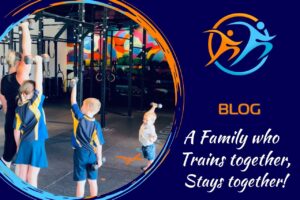The saying “a family who trains together, stays together” suggests that engaging in physical activity or training as a family, can strengthen the bond between family members and promote a sense of togetherness. For many Australians, engaging in a physical activity as a family used to come in the form of a Sunday afternoon walk. However, at Fitter Futures, we provide an environment where the whole family can be involved – observing and participating, role modelling for each other, learning that hard work pays off, and most of all showing the value of staying active, at no matter what stage of life.
Physical activity has numerous benefits for individuals, such as improving health, reducing stress and anxiety, and boosting mood and mental well-being. When families engage in physical activity together – or in this case, engage in physical activity at the same place – it creates an opportunity to bond over shared goals, celebrate personal bests and enjoy experiences. Hallet mentions that “the logistics are much easier when everyone needs to be at the same place at the same time for a class”. At Fitter Futures, we have a unique workout timetable and zone, that allows for an inclusive environment for the whole family. We welcome both adults and adolescents. We are here to support, encourage and help you make time, set goals and tackle any task.
At Fitter Futures, we have a large percentage of members that are family groups. We encourage families to have fun together, because families who make time to have fun together report feeling closer, more satisfied, and more mentally healthy. Families who engage in many types of quality activities are closer and more adaptable too (Human Performance Resources). The benefits of exercising as a family include that it encourages teamwork, strengthens family bonds, teaches goalsetting, promotes healthy habits and increases self-confidence.
Families who keep fit with each other see their attachment, social development and emotional management skills improve. Recent research from the University of Cambridge found that if parents were active, their children were 10 per cent more likely to work out. “As a society, we have become more aware of health and fitness, so we are proactive in finding ways to exercise,” says performance and sports psychologist Michael Inglis. “Parents want to be positive role models to their children.” So, let’s continue to instil these healthy habits in our families so all members of every family can benefit throughout their lives and continue to encourage happier, healthier, fitter futures for all generations to come. Whether grandparent, parent, teen, tween or child, there is a Fitter Future available to all in the one place!

